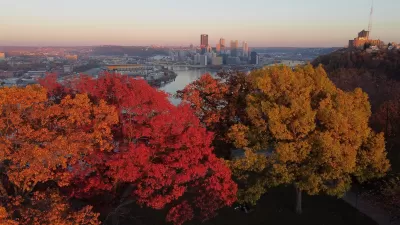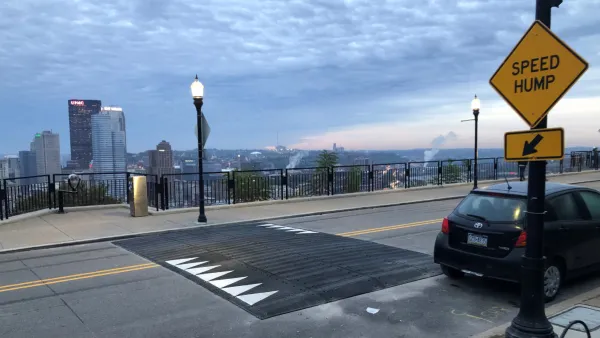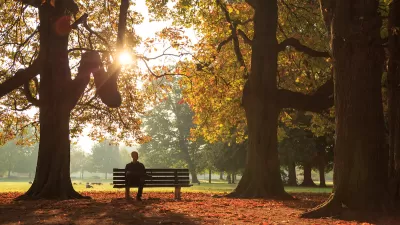The City of Pittsburgh, PA has announced an "urban forest master plan" to add more foliage to the 2.5 million trees already covering the city.
Tree cover reduces energy bills, but is primarily seen as an issue of happiness and health by the city and the USDA. The agency funded the data collection study that inventoried the city's urban trees.
Reporter Diana Nelson-Jones pulls some interesting data from the report:
"The master plan reports the city has more than 2.5 million trees that sequester 13,900 tons of carbon dioxide a year, saved residents $3 million in energy bills last year and remove 519 tons of pollution at a savings of $3.6 million a year. Street trees alone diverted 41.8 million gallons of stormwater last year."
The report also shows that more affluent neighborhoods have more trees. The plan proposes a 20% increase in the canopy over the next 20 years.
FULL STORY: The maple plan: Bringing the forest to the city

Planetizen Federal Action Tracker
A weekly monitor of how Trump’s orders and actions are impacting planners and planning in America.

Restaurant Patios Were a Pandemic Win — Why Were They so Hard to Keep?
Social distancing requirements and changes in travel patterns prompted cities to pilot new uses for street and sidewalk space. Then it got complicated.

Map: Where Senate Republicans Want to Sell Your Public Lands
For public land advocates, the Senate Republicans’ proposal to sell millions of acres of public land in the West is “the biggest fight of their careers.”

Maui's Vacation Rental Debate Turns Ugly
Verbal attacks, misinformation campaigns and fistfights plague a high-stakes debate to convert thousands of vacation rentals into long-term housing.

San Francisco Suspends Traffic Calming Amidst Record Deaths
Citing “a challenging fiscal landscape,” the city will cease the program on the heels of 42 traffic deaths, including 24 pedestrians.

California Homeless Arrests, Citations Spike After Ruling
An investigation reveals that anti-homeless actions increased up to 500% after Grants Pass v. Johnson — even in cities claiming no policy change.
Urban Design for Planners 1: Software Tools
This six-course series explores essential urban design concepts using open source software and equips planners with the tools they need to participate fully in the urban design process.
Planning for Universal Design
Learn the tools for implementing Universal Design in planning regulations.
Heyer Gruel & Associates PA
JM Goldson LLC
Custer County Colorado
City of Camden Redevelopment Agency
City of Astoria
Transportation Research & Education Center (TREC) at Portland State University
Camden Redevelopment Agency
City of Claremont
Municipality of Princeton (NJ)





























